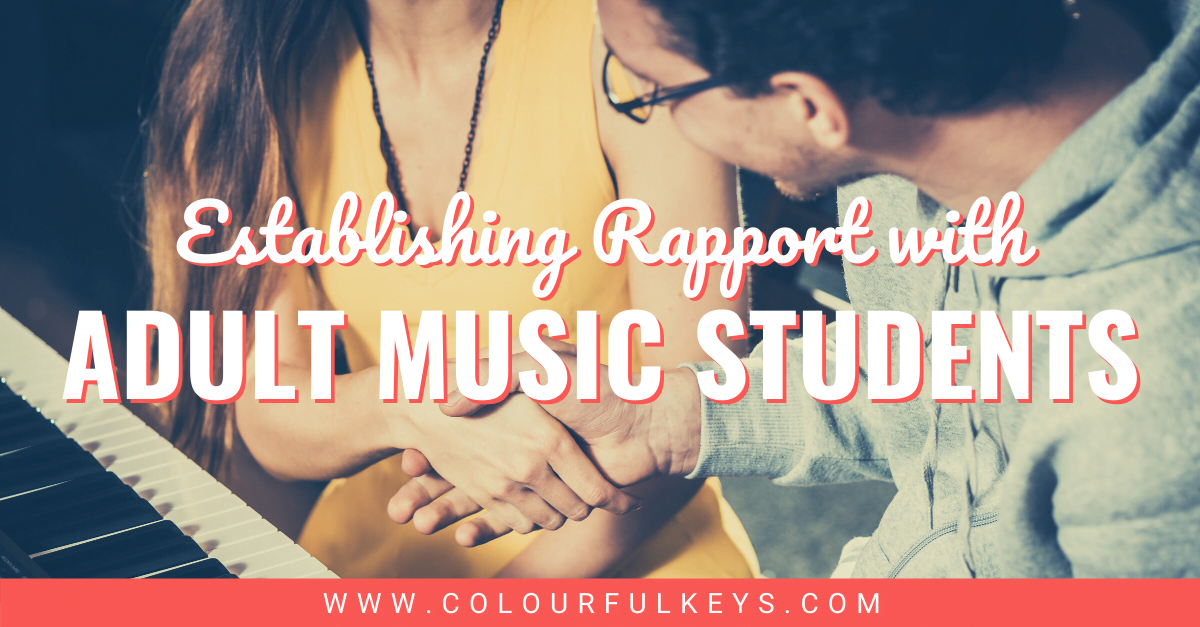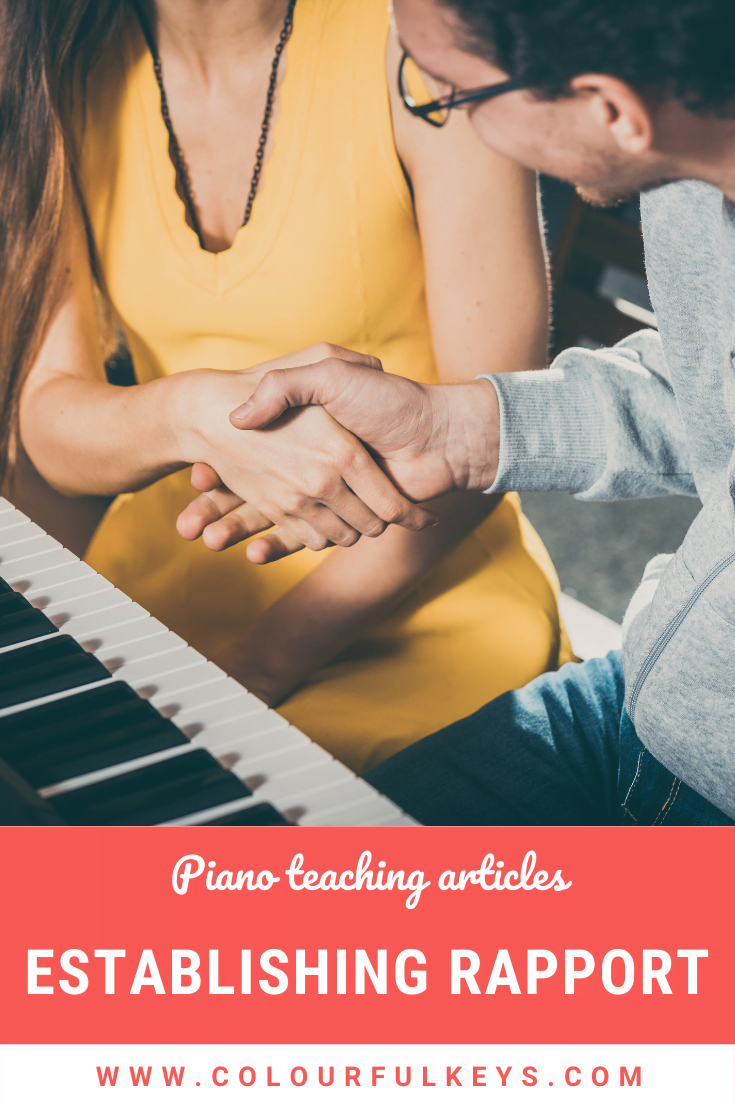This article about working with adult music students is a guest post from our Marketing Assistant, Mallory Byers. Mallory comes from a family of musicians and has been running a boutique piano studio in Los Angeles since 2012. She is passionate about helping students fall in love with music and keeping them engaged in their learning, and she specializes in teaching popular styles and preschool students. Mallory has been featured by Piano Bench Magazine, the Upbeat Piano Teachers, and the Piano Parent Podcast. You can read more from Mallory on her website.
You might assume building rapport with adult students is going to be easy. After all, we’re adults ourselves, right? But developing rapport with adult students might be trickier than you think.

Establishing rapport with students is an important part of teaching, regardless of their ages. It’s important for students to trust us as their teachers and to be comfortable coming to us with questions, concerns, goals and ideas.
Developing that rapport with children tends to be pretty straightforward. They usually come to piano lessons with some idea as to how a student/teacher relationship works. From there, it’s just a matter of entering into their world and expressing interest in them and the things which are important to them.
Rapport established. Easy peasy.
But adults often come to piano lessons with a lot of baggage and preconceived notions which can make it difficult to develop that trusting relationship. Adult students can be self-conscious, and might have had negative experiences with lessons in their past.
Often I’ve been younger than my adult students, which can feel awkward at first.
Knowing an adult student socially outside of piano lessons is another factor which can make it feel strange to enter into a teacher/student relationship.
That’s all to say, cultivating rapport needs to be approached differently when working with adult music students.
I’ve found that keeping these three things in mind can make all the difference when it comes to establishing rapport with adults.
1: Find a Connection Point
In order to build trust in a student/teacher relationship, we need to show an interest in our students’ lives.

Take some time to get to know your students, especially in the first few lessons. This is where small talk can come in handy:
- What part of town are they from?
- If they work, what do they do for a living?
- What do they do for fun?
What’s important here is to find a connection point: something that you can relate to. Did you go to the same university? Do you know people in common? Do you share a hobby or other interest?
Make the effort to learn about them, make a connection, and continue to follow up.
It’s also important to keep things fresh. If you connect with a student at their first lesson because you both took an English class with the same professor in college, don’t continue to just talk about that one professor every week. This feels forced, and it becomes more awkward than helpful.
Your goal here is to simply get to know a bit about your student outside of piano and to make personal connections when you can.
2: Be a Goal Facilitator
While it’s always important to keep our students’ overarching goals in mind, piano lessons for kids tend to be a bit more prescriptive in general. We set a curriculum with our own goals in mind, then help them progress through our curriculum hitting certain milestones along the way.
But unlike children, adults usually start piano lessons with a very specific reason in mind. They may want to learn to play for pleasure and relaxation. They may have their sights set on learning some Chopin or Beethoven or standards. Maybe, they want to play hymns for church.

Regardless of their goals, the standard curriculum you use with kids in your studio won’t work as well for adults.
Adults will quickly lose interest in lessons if the activities don’t seem to be helping them meet their goals.
That’s why the most important thing I need to find out from an adult student in the initial interview or first lesson is why they decided to start piano lessons now.
The approach I like to take with adult students is that of a “goal facilitator.” Adults need a coach more than they need a teacher. They know what they want to accomplish, and they know why they’re paying me. As their teacher, I want to help them achieve their goals by setting manageable, measurable goals to take them from where they are to where they want to be.
Approaching lessons this way goes much further with adult students than it does if you play the role of dictatorial teacher or attempt to fit them into a pre-designed curriculum.
3: Be Vulnerable
Showing some vulnerability is probably the most important thing that we can do to build rapport with our adult students.
One of the biggest struggles I’ve come up against when teaching adult piano students is their self-consciousness around me. They are always quick to say “This sounded better at home” or “I didn’t really have as much time to practice as I’d like.”
Learning something new as an adult is hard. Being an amateur playing the piano for a peer who is a professional is intimidating.
One of the best things we can do to foster a trusting relationship when working with adult music students is to be vulnerable with them.

This doesn’t mean that I air all of my dirty laundry for them. I still want to be professional. But showing my adult students that I am not superhuman can do a lot for their insecurities and self-consciousness around me.
I might play something for them which I’ve just started working on, to show them that I’m not great at every piece at first either. I also talk to them about how I practice.
When I started taking drawing lessons, I was able to share my own struggles in learning a new skill as an adult.
I can tell my students all day long that I won’t judge them or think any less of them if they make mistakes. But being a little bit vulnerable can be a much more effective way to show them that my studio is a safe space.
If you like teaching adult music students, check out Nicola’s Planning Lessons page and scroll down to the ‘Older Students’ section for great articles and resources you can use today.
Even more so than any other age group, teaching adult music students is about the relationship. The more they can trust me and feel that I have their goals and interests in mind, the more successful our lessons will be and the longer they will stick around.
